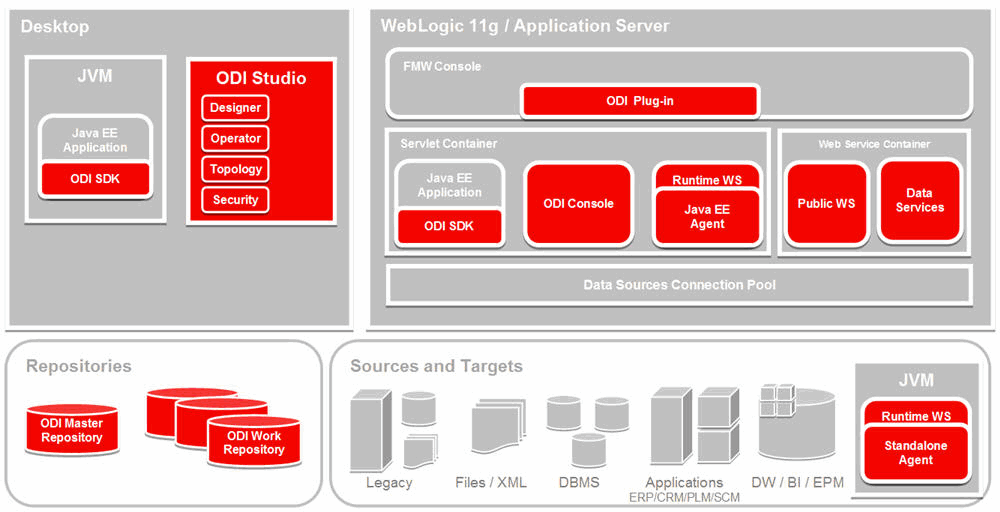Oracle Data Integrator (ODI)
Oracle Data Integrator is a comprehensive data integration platform that covers all data integration requirements: from high-volume, high-performance batch loads, to event-driven, trickle-feed integration processes, to SOA-enabled data services.Oracle Data Integrator (ODI) 12c, the latest version of Oracle’s strategic Data Integration
Objects:
- Introduction to Oracle Data Integrator
- Overview of ODI 11g Architecture
- Overview of ODI 11g Components
- Administrating ODI Repositories and Agents
- ODI Topology Concepts
- Describing the Physical and Logical Architecture
- Setting up a New ODI Project
- ODI Model Concepts
- Organizing ODI Models and Creating Data Sources

Oracle Data Integrator
Course Content
1. Introduction to Oracle Data Integrator
- What is Oracle Data Integrator?
- Why Oracle Data Integrator?
- Overview of ODI 11g Architecture
- Overview of ODI 11g Components
- About Graphical Modules
- Types of ODI Agents
- Overview of Oracle Data Integrator Repositories
2. Administrating ODI Repositories and Agents
- Administrating the ODI Repositories
- Creating Repository Storage Spaces
- Creating and Connecting to the Master Repository
- Creating and Connecting to the Work Repository
- Managing ODI Agents
- Creating a Physical Agent
- Launching a Listener, Scheduler and Web Agent
- Example of Load Balancing
3. ODI Topology Concepts
- Overview of ODI Topology
- About Data Servers and Physical Schemas
- Defining the Physical Architecture
- Defining the Logical Architecture
- Mapping Logical and Physical Resources
- Defining Agents
- Defining a Topology
- Planning the Topology
4. Describing the Physical and Logical Architecture
- Overview of Topology Navigator
- Creating Physical Architecture
- Creating a Data Server
- Testing a Data Server Connection
- Creating a Physical Schema
- Creating Logical Architecture
- Overview of Logical Architecture and Context Views
- Linking the Logical and Physical Architecture
5. Setting up a New ODI Project
- Overview of ODI Projects
- Creating a New Project
- Using Folders
- Organizing Projects and Folders
- Understanding Knowledge ModulesExchanging ODI Objects
- Exporting and Importing Objects
- Using Markers
6. ODI Model Concepts
- What is a Model?
- Understanding Metadata in ODI
- Understanding Reverse Engineering
- Creating Models
- Organizing Models
- Creating Data stores
- Using Constraints in ODI
- Creating Keys and References
7. Organizing ODI Models and Creating Data Sources
- What is an Interface?
- Business Rules for Interfaces
- What is a Mapping?
- What is a Join?
- What is a Filter?
- What is a Constraint?
- What is a Staging Area?
- Creating a Basic Interface
8. ODI Interface Concepts
- What is an Interface?
- Business Rules for Interfaces
- What is a Mapping, Filter, Join?
- Overview of Integration Process
- What is a Staging Area?
- About Execution Location
- Using Knowledge Modules (KM) with ODI Interface
- Creating a Basic Interface
9. Designing Interfaces
- Designing an Interface
- Multiple Source Data stores
- Creating Joins
- Filtering data
- Disabling Transformations
- Overview of the Flow
- Specifying the Staging Area
- Selecting Knowledge Modules
10. Interfaces : Monitoring and Debugging
- Monitoring Interfaces
- Using Operator
- Viewing Sessions and TasksHow to Monitor Execution of an Interface
- How to Troubleshoot a Session
- Keys to Reviewing the Generated Code
- Working with Errors
- Tips for Preventing Errors
11. Using ODI Procedures
- What is a Procedure?
- Examples of Procedures
- Creating Procedures
- Adding Commands
- Adding Options
- Running a Procedure
- Using Operator to View Results
12. Using ODI Packages
- What is a package?
- Creating a package
- Executing a package
- Creating Advanced Packages
- Error handling
- Controlling an Execution Path
- Creating a Loop
- Using the Advanced tab
13. Managing ODI Scenarios and Versions
- What is a Scenario?
- Managing Scenarios
- Preparing Scenarios for Deployment
- Automating Scenario Management
- Scheduling the ODI Scenario
- Overview of ODI version management
- Using Version Browser and Version Comparison Tool
- Handling concurrent changes
Our distinct services include :
- Material and Documents: We provide real time working documents and materials to our students.
- Free System Access : We have the latest and most up to date platforms deployed on high-end servers that are available remotely and in-class on a 24/7 basis.
- Interview Preparation: We will prepare you for interviews in your specialized area by providing some real time interview questions. We also conduct mock interviews and assist you in preparing a professional resume.
- Placement Assistance: Our placement service division provides job placement support by submitting your resumes to prospective clients and emails you any new job opportunities in the market. However, we do not provide false guarantees on securing any jobs for you. We have a history of several ex-students who have secured excellent jobs based on our WORLD class training approach, implementation of case study projects and post training support.
- Initial Job Stabilization Support: We support our students to get stabilized in their job in the first TWO months. If our students come across any issues, we are there to help them. Students can send an email to us with their issues, our experts will reply back with possible solutions within 24 hours.
- Free Class Room sessions recording: In addition to the e-class training, we will give you authorization to record all of your e-class room training sessions, so that you can go back and review.
Other Courses related
Course registration
Instructor Led Hands-on eClassroom Training.
Key Points of Training Program :
Oracle Data Integrator Courses, Learn with Online Practice, in-class Seminars, Training and Certification from the list of world-class education trainers. Macropus provides Class Material, Tutorial Curriculum, Demo Videos, Sample Questions, Recommended Books, Tips and Tricks. Get lectures and practical lessons on development and programming to improve technical skills and Students will benefit with Job Placements, Visa.
